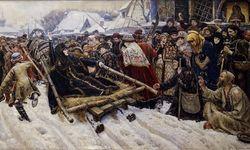And Catholic culture really matters.
Br. Gabriel Torretta explains:
There are things no one tells you when you convert to Catholicism: that six-year-olds will know prayers you don’t; that you’re supposed to end every statement about a future contingent with “God willing”; and that you will feel the irrepressible urge to genuflect before leaving a room where something important has happened.
There are others as well, of course. Who knew that when someone says a saint’s name and pauses, you’re supposed to respond “Pray for us”? And why didn’t anyone ever tell me that when you’re blockingsomeone’s access to a holy water font on the way into church, you’re supposed to form a holy bucket brigade by letting him touch your wet fingers? Or that “Thank God” and “Awesome” can be used interchangeably when someone is telling you good news?
Adults converts like me will surely be familiar with the many minor moments of confusion that crop up at church and social settings where Catholics predominate. Even after almost fifteen years as a Catholic and six years as a vowed religious, there are still moments when everyone else knows just what to do or say and I don’t. It’s like being a citizen of a country you weren’t born in; sure, this is your home now, but that doesn’t make you a master of the culture.
That last comparison is key. Christianity in general–and Catholicism in particular–is not just a collection of rituals and dogmas. It is a culture. And, like all cultures, it becomes your own only after years of living immersed in it, not by merely memorizing practices and principles.
This is, I think, part of what Pope Francis is getting at in his recent exhortation Evangelii gaudium, where he talks about “the evangelizing power of popular piety.” When I hear the term “popular piety,” I often think about the sweet old ladies who would corner me after mass when I was in graduate school, foisting on me fistfuls of holy cards and devotional pamphlets they pulled out of their overstuffed purses, assuring me with utter confidence that God wanted me to become a priest, based on nothing other than their knowledge that I was a single man in my twenties showing up to daily mass (They won this round, I guess). Others might think of certain devotional practices like the rosary or the Divine Mercy chaplet. Yet others might think of nebulous, semi-superstitious practices like burying a statue of St. Joseph upside down in the yard of a house to be sold.
But none of these examples express the full reality of what the pope is talking about.
Do finish the post particularly if you're wondering why becoming part of a faith culture is so important.
Just do it.
Then carry on.
 someone’s access to a holy water font on the way into church, you’re supposed to form a holy bucket brigade by letting him touch your wet fingers? Or that “Thank God” and “Awesome” can be used interchangeably when someone is telling you good news?
someone’s access to a holy water font on the way into church, you’re supposed to form a holy bucket brigade by letting him touch your wet fingers? Or that “Thank God” and “Awesome” can be used interchangeably when someone is telling you good news?